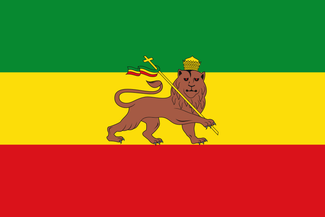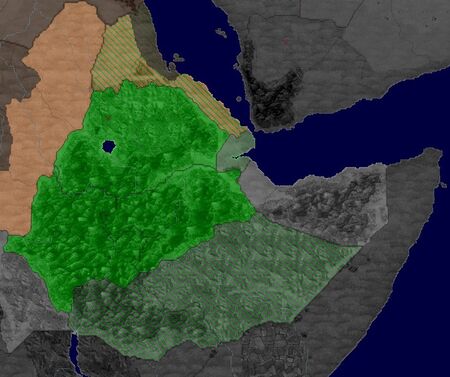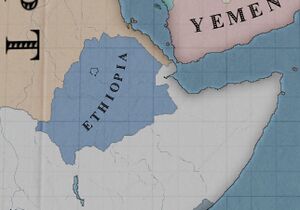| 埃塞俄比亚 | |
|---|---|
 | |
| 政府类型 | Absolute Monarchy |
| 执政党 | Royal Faction (conservatives) |
| 首都 | Gonder |
| 人口 | 1.30m |
| 主体民族 | Amhara |
| 被接受民族 | Oromo |
| 识字率 | 6.5% |
| 国家价值观 | Order |
| 科研学派 | Uncivilized |
| 地位 | Uncivilized Nation |
Ethiopia is a medium-sized, land-locked, uncivilized nation on the horn of Northeast Africa. It is in unique position compared to other African nations, as it presents many challenges on the path to civilization, but also several advantages. If the player is successful in westernizing, it can easily reach Secondary power or even Great Power status.
Challenges
Ethiopia has a relatively small population (Not much more than one million in 1836), and to make matters worse, it is equally split between Amhara and Oromo cultures. This means that Ethiopia will never have more than two national foci, and will have only one for most if not all of the game. Low population will also result in difficulty in raising an army. The population is also largely illiterate; while not as bad as some uncivilized nations, it is still a significant obstacle in the path of progress. Ethiopia starts out landlocked, so naval power is out of the question, as well as immigration. Finally, Ethiopia only has one neighbor - ![]() Egypt to the north - that initially can support a larger and technologically superior army, and has eyes on Ethiopian land. Egypt will more than likely declare war on Ethiopia in one to two years. One can try to ally Egypt, but then one will have trouble when the
Egypt to the north - that initially can support a larger and technologically superior army, and has eyes on Ethiopian land. Egypt will more than likely declare war on Ethiopia in one to two years. One can try to ally Egypt, but then one will have trouble when the ![]() Ottoman Empire attacks Egypt
Ottoman Empire attacks Egypt
Advantages
Fortunately for the player, Ethiopia has several advantages to counterbalance its challenges. It is a relatively rich nation that produces a large amount of ![]() coffee. It may have budget issues at the start, but once Freedom of Trade is researched or one gets some economic reforms, these issues mostly disappear. Ethiopia also starts with a decent population of clergymen, so literacy and research issues can be easily, but slowly overcome.
coffee. It may have budget issues at the start, but once Freedom of Trade is researched or one gets some economic reforms, these issues mostly disappear. Ethiopia also starts with a decent population of clergymen, so literacy and research issues can be easily, but slowly overcome.
Ethiopia has the decision Negusa Nagast, which gives cores on some of the uncolonized provinces, that border Ethiopia.

Finally, Ethiopia is in a wonderful defensive position. Until the Suez Canal is constructed, invading armies other than Egypt, must either march south across the Egyptian desert, or sail around the entirety of Africa to the Red Sea, and in both cases will suffer terribly from attrition. When they finally arrive they will have to attack hilly and mountainous regions, which carry a significant defensive bonus. This position makes it easy for Ethiopia to repel invasions from Egypt or interventions from Great Powers.
First steps
Above all, the player's first priority should be to raise the nation's literacy. Maximizing education spending, encouraging ![]() clergymen in the most populous state (Negele), and minimizing middle class taxes will put things on the right track. The player should also maximize administration spending and raise defense spending to as high as possible to start improving efficiency and encouraging
clergymen in the most populous state (Negele), and minimizing middle class taxes will put things on the right track. The player should also maximize administration spending and raise defense spending to as high as possible to start improving efficiency and encouraging ![]() soldiers and
soldiers and ![]() officers, when Ethiopia has sufficient clergymen. Upper class taxes should be maximized, and lower class taxes should be set to balance the budget.
officers, when Ethiopia has sufficient clergymen. Upper class taxes should be maximized, and lower class taxes should be set to balance the budget.
Diplomacy-wise, the player should begin currying favor with the Great Powers, particularly the Ottomans. Getting into a GP's sphere of influence is a good form of protection, but Ethiopia is not particularly valuable to them and not likely to be sphered. Finally, Ethiopia starts with nine brigades of ![]() irregulars and enough manpower for three more - it is highly recommended to build three infantry brigades if one can afford them.
irregulars and enough manpower for three more - it is highly recommended to build three infantry brigades if one can afford them.
The First War
One has to expand early to help the economy, and to get crucial research points to westernize. One does not have sea access nor the manpower to attack a nation outside of Africa. Neither do they have the possibility to ally a greater power and let them do the work. There are a couple of potential targets but the three most obvious are:
- Egypt. Ethiopias neighbour. They are superior in manpower and tech, but it should be possible to beat them when The Ottoman Empire attacks for its cores. Egypt has Khartoum, a large populous region next to Ethiopia and it will be the obvious target. One does also need ports if one wishes to colonize Africa, which is suggested. Ethiopia will gain cores on Egypt with the decision Negusa Nagast.
 Sokoto. Lies across Africa in modern Nigeria. One can double ones population by taking Sokoto and they will have a good amount of soldiers for Ethiopias armies. They are around the same strength as Ethiopia, and will take multiple wars to conquer. One have to walk over the desert of Africa to attack them.
Sokoto. Lies across Africa in modern Nigeria. One can double ones population by taking Sokoto and they will have a good amount of soldiers for Ethiopias armies. They are around the same strength as Ethiopia, and will take multiple wars to conquer. One have to walk over the desert of Africa to attack them.- North Africa.
 Morocco,
Morocco,  Algeria or
Algeria or  Tunis can be annexed. Morocco has a source of gold which
Tunis can be annexed. Morocco has a source of gold which  Spain has its eyes out for. Algeria and Tunis has a fine population that will help the economy. All three are initially weaker than Ethiopia (especially Tunis) and will usually be attacked by European states.
Spain has its eyes out for. Algeria and Tunis has a fine population that will help the economy. All three are initially weaker than Ethiopia (especially Tunis) and will usually be attacked by European states.
Other targets could be ![]() Transvaal,
Transvaal, ![]() Oranje,
Oranje, ![]() Oman or
Oman or ![]() Yemen.
Yemen.
The Road to Westernization (1836-1860)
War with Egypt is inevitable - either they will declare war on Ethiopia, or the player must declare war on them to expand. It may be a good but risky idea to declare war as soon as possible, but Egypt starts with a large army near the player's border. In either case, the best course of action is to move armies to the northern border provinces and wait for the Egyptians to attack. They have a tendency to assault the mountainous province of Matamma, which gives the defender a significant terrain bonus. Even if the player is defeated in battle, the Egyptians will suffer high attrition while they attempt to occupy the province. In the meantime, the Ethiopian armies can begin occupying the grassland provinces which can support up to 14,000 occupying soldiers. If fighting defensively, the player should add a wargoal to annex either Asmara or Khartoum (or both if the war is going well enough). The former provides access to the sea, and the latter has a large population. Consider adding a Humiliate or Release People casus belli as well to gain prestige or further cripple Egypt. The Ottomans also tend to declare war on Egypt early on, and if they do then the player can enter and occupy Egypt with impunity, as their forces will be occupied up north.
If the player is successful in annexing Asmara, work should begin on naval construction both for protection from intervention forces and for gaining military score. Acquiring artillery and clipper convoys will be a significant limiting factor and will be very expensive, but a little prestige (the Negusa Nagast decision provides a small amount) can help combat these issues. Egypt will be less likely to attack if Ethiopia has a modern army, and can be easily defeated in offensive wars. Future wars with Egypt acquiring the high-population coastal states. The player can still declare war if Egypt is protected by a great power - the USA and the European powers are very unlikely to actually send an intervention force, although the Ottomans could pose a threat. Consider declaring a war of humiliation on Yemen, which can be reached by foot via a land bridge in Djibouti. Yemen itself has very little of value, so it is not worth the infamy cost of a war of conquest.
Conquest and research will help westernizing.
Post-Westernizing
Ethiopia has one of the best positions to colonize Africa. The problem is that one have to westernize, Get the right techs and become a secondary power in time. Additionally one needs enough naval bases to colonize as much as possible.
If one gets the right conditions in time, it should be no problem to colonize all the valuable provinces in East Africa.
